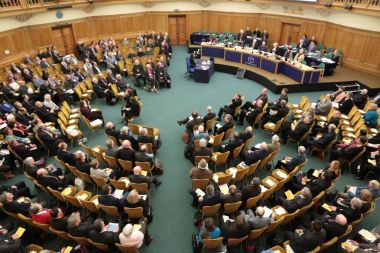Church of England to consider 'transgender baptism' service

A "transgender baptism" service is to be considered by the Church of England for the first time.
The idea is to bless into God's family the new identities of Christians who have undergone gender transition.
The proposal was welcomed by the Church's most senior trans priest. Rev Rachel Mann, Rector of St Nicholas Burnage and a minor canon at Manchester Cathedral, told Christian Today: "Trans people feel powerfully called to be recognised in their 'chosen' name. An opportunity to be publicly introduced to God is therefore significant. I think this is what the proposed liturgy aims to do. It will be symbolically powerful. The extent to which it is [a form of] baptism will be debated by General Synod of course, but this liturgy is a welcome move to affirm Trans people."
There is no guarantee the proposal will succeed. It is in the form of a diocesan motion to the General Synod and needs to wait its turn to get debated on the floor. But it is certain to generate contention in a Church still struggling with its position on sexuality.
Rev Chris Newlands, vicar of Lancaster Priory, called for the change after he was approached by a young transgender person born a girl but transitioned to a boy seeking to be "re-baptised", the Guardian reports today. The vicar had at first thought the rule of one baptism sufficed, but changed his mind after discussing issues of identity with the young man.
He created a new service to affirm the original baptismal vows of the individual who was "introduced" to God with his new name and identity.
The motion, passed by Blackburn Diocese last month, states: "That this Synod, recognising the need for transgender people to be welcomed and affirmed in their parish church, call on the House of Bishops to consider whether some nationally commended liturgical materials might be prepared to mark a person's gender transition."
Newlands told the Guardian he knew a number of trans people though his work with LGBT organisations. "It's an absolute trauma to go through this, with the surgery, as people get a lot of transphobic bullying. The church needs to take a lead and be much more proactive to make sure they are given a warm welcome."
The motion had "captured people's imagination", he said, and already gathered a large amount of support, being passed by the parochial church council, the Deanery Synod and the Blackburn Diocese, which covers Lancashire.
Newlands said: "I wanted to bring it to the General Synod as a commitment that bishops will take seriously, and for them to take the next step of getting a liturgy which parish priests can use for people who do the transition where they can be affirmed in the church."
Another individual, Susan Musgrove, 62, who underwent gender reassignment three years ago, also had a service of "public affirmation" at St Andrews Church, in Corbridge.
Musgrove, who has written about her experience, described it as the "final stage in what has been a life-long journey".
She said: "Give Blackburn their due, they have put this down as a one-line motion. It's no big deal, it shouldn't be a big deal."
The Church of England's official position on transgender issues is described in a House of Bishops memo in 2003.
Andrew Symes, of the conservative evangelical group Anglican Mainstream, said: "The Christian faith has always taught that people are created male and female. We speak for the conservative traditional point of view. We are aware there are a number of people who want to change from one gender to another and that's a new thing for the church to deal with. It would be something that would go against the teachings of the church up till now. It would be something that would cause controversy.
"To recognise all people is something the church should be doing but to have a service of blessing for someone to change their gender is a new idea. It's not been discussed before in the Church of England. It would need a lot of discussion and debate by theologians and I would need to know whether there are other agendas by the people bringing it. I would be very surprised if the diocese has passed the motion without a lot of discussion and debate."
The Archbishops' Council said: "Any of the 42 diocesan synods is free to propose items for debate at the General Synod. The Blackburn motion will join a queue of motions for debate and is therefore unlikely to be debated imminently. As the motion itself makes clear, any motion passed at General Synod would be the beginning not the end of a process."











